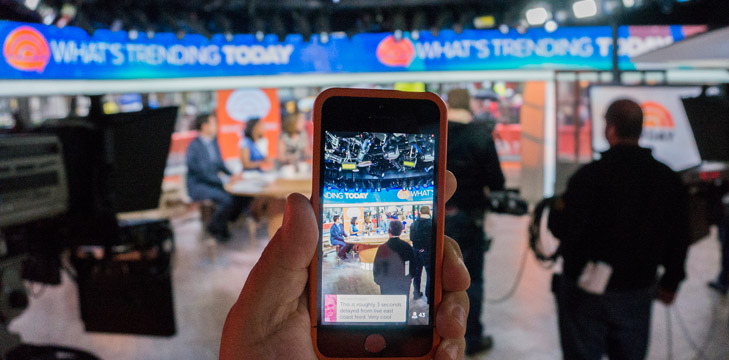"Look Ma, I got 1 million views!"

Technology is pushing society onwards and upwards as we create, develop and upgrade the world around us and, as expected, this push has opened up a whole new field of careers which never existed several decades ago. One of these professions which to many is still quite misunderstood, is internet personalities.
An internet personality, plainly put, is someone who has gained fame through the usage of the internet. Just like good old TV personalities which ran across our screens for years. The key difference would be found in the platform. The internet as a general rule, is much more accessible for people to put up their content. While the broader population who watch TV might not care about your antique Indonesian tea box openings, chances are there is a probably small (or very large) community on the internet who can't wait for your next un-boxing. The internet is the biggest melting pot of people the world has ever seen, all with the ability to upload, contribute, comment and critique. Using resources like YouTube for example, you can upload content that would never make it onto national, or even local television for everyone to enjoy (or not enjoy, the internet can be mean...)
I feel like a possible reason for the generational gap which is present when it comes to understanding internet personalities can be attributed to the fact that many of these internet personalities exist almost entirely within the internet. Everyone knows who Beyoncé is, she's been on TV, she's acted in movies, she's a stadium filling vocalist, but what about PewDiePie? Or nigahiga? Or shroud?
Some of the internet's most succesful personalities are YouTubers (people who post content on YouTube). However, the profession is a tricky one to break into, especially nowadays. There are already very well established and well-known YouTubers and it can be very easy for your content to be lost in the swirling vortex of video footage on YouTube. Also, being successful as an internet personality is almost entirely directly related to your popularity and audience size, and because of the nature of the internet, audiences can shift in size very quickly, which creates a need for content creators to be original and pay a close eye on their audience's opinions and wants (while also not letting the audience dictate the content). 
The beauty of the internet is that the content can be anything, as long as people want to watch it and are entertained. Some strange examples include the YouTuber FPSRussia, who was a (supposedly) Russian guy who shot at targets and the occasional watermelon with a rotating roster of different firearms, as well as cooking his breakfast on a AK-47 amongst other crazy things. He has a YouTube community of almost 6.5 million subscribers. Another is very well know YouTuber Ryan Higa, also know as nigahiga. He along some of his friends made funny, satirical videos of themselves pretending to sell fake products online, he was the first YouTuber to hit 3 million subscribers and is still uploading videos 12 years later, with his subscriber count now at just over 21 million.
The biggest YouTuber however, is Swedish born Felix Arvid Ulf Kjellberg, or better known online as PewDiePie. Who started his YouTube channel with "Let's play" style videos, where he would play a video game and commentate on his own gameplay. His lovable personality and goofiness soon drew in millions and millions of people who loved to watch him play video game after video game. PewDiePie now has 64 million subscribers on YouTube, putting him 11 million above the closest competition (A Hindi TV/Music network).
Another way to achieve internet fame is through live-streaming. Live-streaming is streaming any content live to an audience. The concept of streaming is quite well understood by everyone (since it's basically like watching live TV...). Live-streaming can be done by anyone with an internet connection and some content to share. In fact with platforms such as Twitch, YouTube live, UStream (amongst many others), its become easier than ever. Twitch is a prime example. What began as a small platform for people to stream themselves playing video games for others to watch has grown into a global giant, which Amazon decided to acquire in 2014 for US$970 million. Streamers on Twitch mainly play video games, however, there are many other categories for people to watch such as musicians, artists, talk shows or even just people who grab their camera and phone, and head out onto the streets to walk around and talk to strangers.
"But, how do they make money?"
A question I often get asked when discussing internet personalities and internet culture with people. Well... advertising mainly. While TV commercials and newspaper/magazine advertisements were the best way to get your advertising across to an audience, internet advertisements have skyrocketed to the top of the advertising totem pole. Let's take PewDiePie as an example (64 million subscribers), having an advert playing before one of his videos could display your product to a potential audience of 64 million people, and that's only his subscribers (who will be alerted to a new PewDiePie video whenever one comes out) and not even considering the sheer amount of people who stumble across his videos. So YouTubers mainly find revenue in adverts. However, on Twitch, while adverts are still a source for income, streamers rely more on donations from their audience, as well as sponsorships for companies who wish to affiliate themselves with the streamer. If you had a gaming mouse and keyboard company, surely you'd want a streamer who gets a daily audience of 45 000 people to be using your mouse and keyboard, what better advertising chance can you get?
In addition, with some of these internet personalities having the incredibly big audiences that they do, it gives them an opportunity to go a lot of good for society. Many YouTubers have charity drives and encourage their subscribers to all donate to a cause. Imagine if each one of your 20 million subscribers gave US$1 to a charity... In fact, Twitch, that place where "lazy gamers" stream their games for people to watch, has collectively through charity streams, given over US$75 million dollars to charities worldwide. So yes that's right! Playing video games all day can actually make other people's lives better...
Many people will still scratch their heads at these internet personalities who can make a very good living by filming themselves walking around malls, or shooting zombies. But the online community keeps growing everyday, and as audiences for streamers and YouTubers get bigger and bigger, maybe the age of tuning into your 6 o'clock soap is slipping away and maybe there is something to antique Indonesian tea un-boxings...
